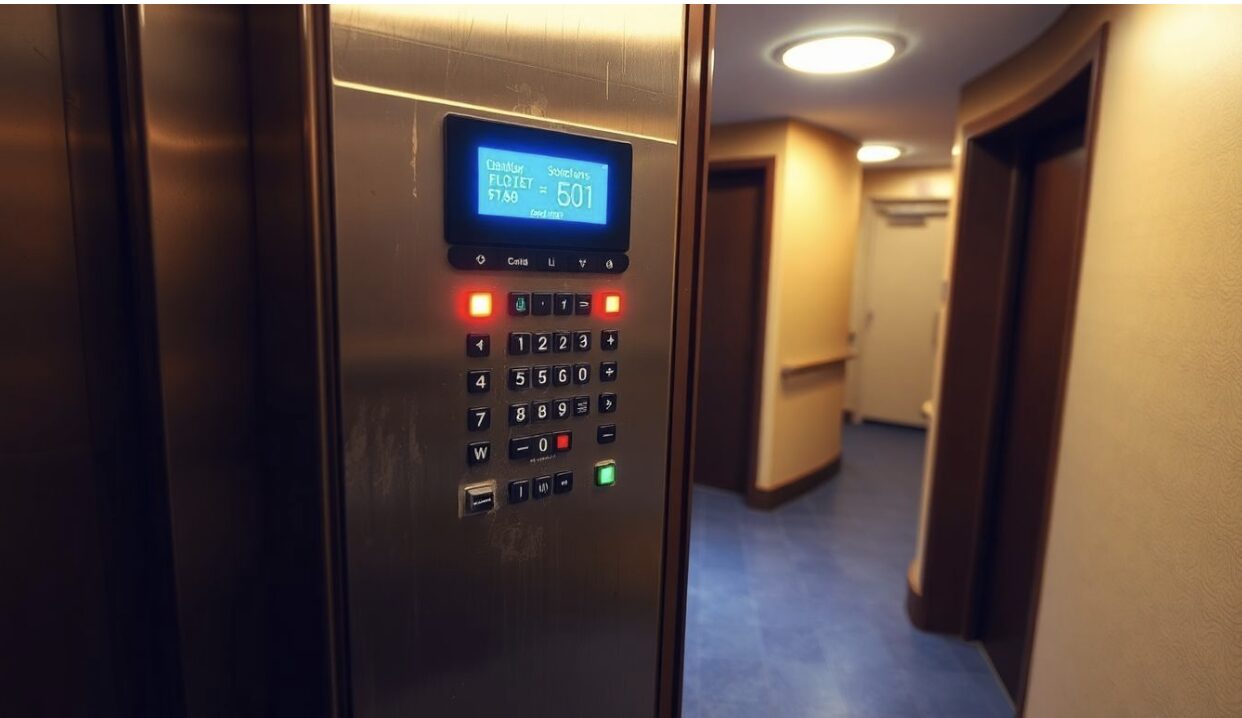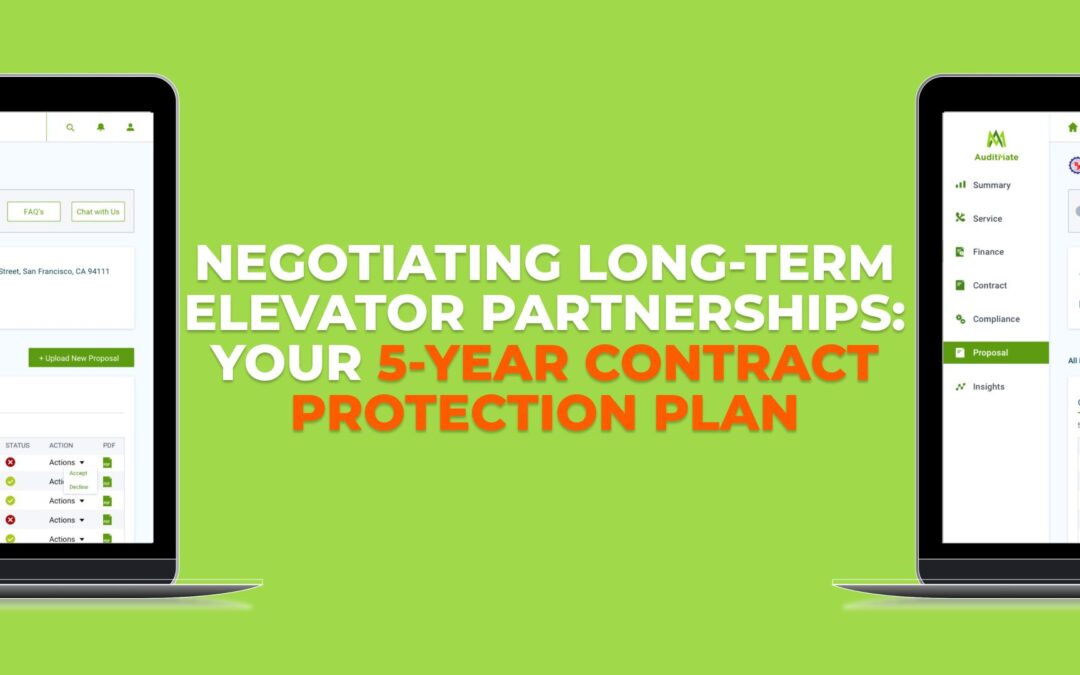Many building owners struggle with elevator maintenance contracts. Good contracts can cut costs and avoid problems. This guide will help you build a strong five-year plan for your elevators, covering key points like bonuses for good performance and high standards for technicians.
Understanding the Importance of Long-Term Elevator Contracts
Long-term elevator contracts ensure elevators work well and safely. Most of these agreements last five years. They often renew automatically for another five unless the owner cancels 90 days before expiration.
This automatic renewal is legal in some states, such as California.
Early in the contract, it spells out cost increases after renewal. Changing these costs later might lead to higher expenses. Agreeing to renew through a phone call is risky compared to written agreements because it’s not as legally binding.
Contracts that extend indefinitely require clear termination clauses. Owners must follow these clauses strictly to cancel services; otherwise, they keep paying under the contract terms.
Key Focus Areas for Negotiating a 5-Year Elevator Contract
Negotiating a 5-year elevator maintenance contract requires setting clear performance incentives, rules for price increases, and maintenance schedules. Contract management systems simplify tracking these details to ensure smooth service over the contract’s lifetime.
Performance bonus structures
Performance bonus structures offer extra pay to elevator companies for exceptional work, like finishing projects early. These bonuses are tied to specific goals, such as achieving project milestones.
This setup ensures building owners can track progress and reward achievements accordingly. The criteria for these rewards must be clear and measurable.
Penalties apply if a company fails to meet its targets, encouraging timely, high-quality work.
Regular elevator maintenance checks reduce unexpected problems. Only qualified inspectors with proper certifications should conduct these reviews.
The contract should state parts costs upfront to avoid surprise expenses. It limits annual price increases for easier budgeting.
A contract management system organizes all details in one place, reducing confusion and preventing errors.
Penalty enforcement mechanisms
Enforcing rules with penalty mechanisms is essential in elevator contracts. These penalties ensure that contractors meet performance deadlines and maintain high standards. If a contractor fails to comply, they face fines known as liquidated damages.
The contract requires contractors to have insurance and worker’s compensation. This coverage safeguards them and others from potential accidents. Penalties are clearly outlined for not adhering to maintenance schedules, worker qualifications, and parts pricing.
Violations could result in financial penalties or legal action.
After the project ends, these penalties also guarantee compliance with inspection protocols and post construction services. They make sure elevators are checked and repaired regularly according to the agreement.
Maintenance frequency requirements
Building owners and facility managers must set a clear maintenance schedule for their elevators, choosing between monthly or quarterly checks to ensure smooth operation. They should get reports on every inspection and completed work ticket.
This aligns the maintenance frequency with the elevator’s usage rate.
It’s crucial to maintain consistent check-ups, establishing expectations. Setting up guidelines for additional support during regular hours improves reliability. Knowing when not to include issues caused by misuse or intentional damage is also important.
Evaluating how frequently maintenance occurs can lead to better service quality over time.
The section on what technicians need to know emphasizes ensuring they have the right knowledge and follow through accordingly.
Technician certification standards
Having technician certification standards in your elevator contract is crucial. Certified technicians complete a 4-year program, showing their competency and commitment to maintaining elevators safely.
“Certification improves service reliability and safety.”
Hiring certified technicians ensures your elevators are in skilled hands. While not all technicians need certification, choosing certified ones guarantees expertise and a focus on safety.
This provides peace of mind by ensuring reliable and safe elevator maintenance.
Parts pricing controls
After setting standards for technician certification, focus shifts to parts pricing controls. This is crucial for managing costs. Building owners should opt for full maintenance contracts that detail which parts and costs are excluded.
Secure clear repair rates and callback fees, including discounts.
Parts pricing controls prevent unexpected bills. Owners need clear pricing to avoid hidden charges. Regularly review spare parts terms to ensure fairness over time. This approach helps control maintenance costs and keeps budgets on track without surprise cost increases.
Contract escalation caps
Contract escalation caps control long-term costs by setting yearly price increase limits. This planning tool helps building owners manage their budgets effectively. They rely on historical data and industry standards to prevent unexpected cost hikes.
Regular contract reviews allow building owners to understand the impact of price adjustments. Clear guidelines for price increases ensure smooth budgeting, eliminate cost surprises, and support stable financial planning.

Leveraging Technology in Contract Management
In building management, a 5-year elevator maintenance contract offers stability and keeps elevators working well. Long-term partnerships are crucial because they ensure consistent service quality and predictable costs. When negotiating these contracts, focus on performance bonuses, penalty enforcement, regular maintenance schedules, certified technicians, parts pricing controls, and price escalation caps to get the best deal. Using contract management systems can help track these elements effectively.
Benefits of contract management systems
Technology improves contract management for building owners and facility executives.
- Contract management systems cut down on manual errors, leading to fewer contract mistakes.
- These systems make creating and signing contracts smoother and more organized.
- By automating, these systems complete tasks quicker than humanly possible.
- Technology aids in better negotiations by providing data for informed decisions.
- Using automated systems reduces unnecessary costs.
- For energy companies, technology revolutionizes how they manage contracts and save energy.
- Enhanced contract management boosts business efficiency and increases profits.
Leveraging technology ensures long-term improvement in managing contracts.
Conclusion
Negotiating a five-year elevator maintenance contract secures your building’s service and pricing. It emphasizes areas such as rewards for excellent service, penalties for subpar efforts, frequency of inspections, responsibility for repairs, and cost of parts to ensure clarity.
Setting caps on price increases further safeguards interests. Leveraging software for contract management simplifies tracking. This approach prioritizes informedaed decisions to prevent future issues.
FAQs
1. What is a long-term elevator partnership?
A long-term elevator partnership refers to an agreement made between you and your elevator service provider. This contract, often lasting five years or more, outlines the terms of maintenance, repair services and overall management of your elevators.
2. How can I protect my interests in a 5-year contract?
To ensure protection during a 5-year contract period, it’s key to negotiate terms that favor both parties before signing. You should consider aspects like regular maintenance schedules, emergency response times and cost escalations over time.
3. Why is negotiation important in these partnerships?
Negotiation plays a crucial role in establishing fair conditions for both sides in the partnership. It helps set clear expectations about responsibilities, costs involved and how disputes will be handled if they arise during the term of the contract.
4. Are there any tips for negotiating these contracts effectively?
Absolutely! First – understand what you need from this partnership… Is it just routine maintenance? Or do you anticipate major repairs? Knowing your needs helps set the groundwork for negotiations… Also – don’t shy away from discussing difficult scenarios like breakdowns or accidents… Lastly – always keep open lines of communication with your partner throughout the duration of your contract… Remember – good partnerships are built on trust and transparency!

